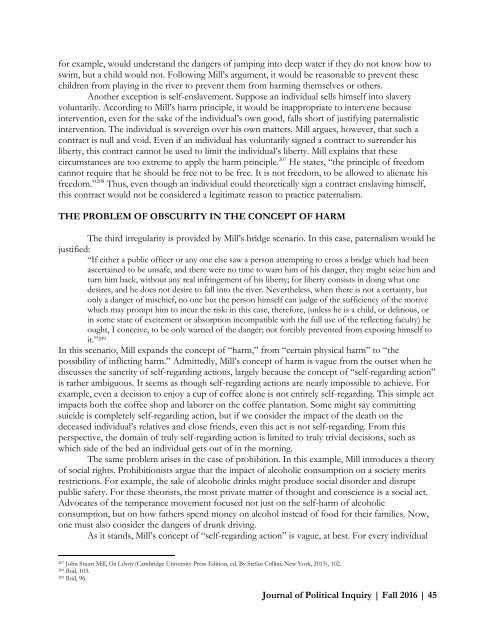Fall2016_Final
Create successful ePaper yourself
Turn your PDF publications into a flip-book with our unique Google optimized e-Paper software.
for example, would understand the dangers of jumping into deep water if they do not know how to<br />
swim, but a child would not. Following Mill’s argument, it would be reasonable to prevent these<br />
children from playing in the river to prevent them from harming themselves or others.<br />
Another exception is self-enslavement. Suppose an individual sells himself into slavery<br />
voluntarily. According to Mill’s harm principle, it would be inappropriate to intervene because<br />
intervention, even for the sake of the individual’s own good, falls short of justifying paternalistic<br />
intervention. The individual is sovereign over his own matters. Mill argues, however, that such a<br />
contract is null and void. Even if an individual has voluntarily signed a contract to surrender his<br />
liberty, this contract cannot be used to limit the individual’s liberty. Mill explains that these<br />
circumstances are too extreme to apply the harm principle. 207 He states, “the principle of freedom<br />
cannot require that he should be free not to be free. It is not freedom, to be allowed to alienate his<br />
freedom.” 208 Thus, even though an individual could theoretically sign a contract enslaving himself,<br />
this contract would not be considered a legitimate reason to practice paternalism.<br />
THE PROBLEM OF OBSCURITY IN THE CONCEPT OF HARM<br />
The third irregularity is provided by Mill’s bridge scenario. In this case, paternalism would be<br />
justified:<br />
“If either a public officer or any one else saw a person attempting to cross a bridge which had been<br />
ascertained to be unsafe, and there were no time to warn him of his danger, they might seize him and<br />
turn him back, without any real infringement of his liberty; for liberty consists in doing what one<br />
desires, and he does not desire to fall into the river. Nevertheless, when there is not a certainty, but<br />
only a danger of mischief, no one but the person himself can judge of the sufficiency of the motive<br />
which may prompt him to incur the risk: in this case, therefore, (unless he is a child, or delirious, or<br />
in some state of excitement or absorption incompatible with the full use of the reflecting faculty) he<br />
ought, I conceive, to be only warned of the danger; not forcibly prevented from exposing himself to<br />
it.” 209<br />
In this scenario, Mill expands the concept of “harm,” from “certain physical harm” to “the<br />
possibility of inflicting harm.” Admittedly, Mill’s concept of harm is vague from the outset when he<br />
discusses the sanctity of self-regarding actions, largely because the concept of “self-regarding action”<br />
is rather ambiguous. It seems as though self-regarding actions are nearly impossible to achieve. For<br />
example, even a decision to enjoy a cup of coffee alone is not entirely self-regarding. This simple act<br />
impacts both the coffee shop and laborer on the coffee plantation. Some might say committing<br />
suicide is completely self-regarding action, but if we consider the impact of the death on the<br />
deceased individual’s relatives and close friends, even this act is not self-regarding. From this<br />
perspective, the domain of truly self-regarding action is limited to truly trivial decisions, such as<br />
which side of the bed an individual gets out of in the morning.<br />
The same problem arises in the case of prohibition. In this example, Mill introduces a theory<br />
of social rights. Prohibitionists argue that the impact of alcoholic consumption on a society merits<br />
restrictions. For example, the sale of alcoholic drinks might produce social disorder and disrupt<br />
public safety. For these theorists, the most private matter of thought and conscience is a social act.<br />
Advocates of the temperance movement focused not just on the self-harm of alcoholic<br />
consumption, but on how fathers spend money on alcohol instead of food for their families. Now,<br />
one must also consider the dangers of drunk driving.<br />
As it stands, Mill’s concept of “self-regarding action” is vague, at best. For every individual<br />
207<br />
John Stuart Mill, On Liberty (Cambridge University Press Edition, ed. By Stefan Collini, New York, 2013), 102.<br />
208<br />
Ibid, 103.<br />
209<br />
Ibid, 96.<br />
Journal of Political Inquiry | Fall 2016 | 45
















